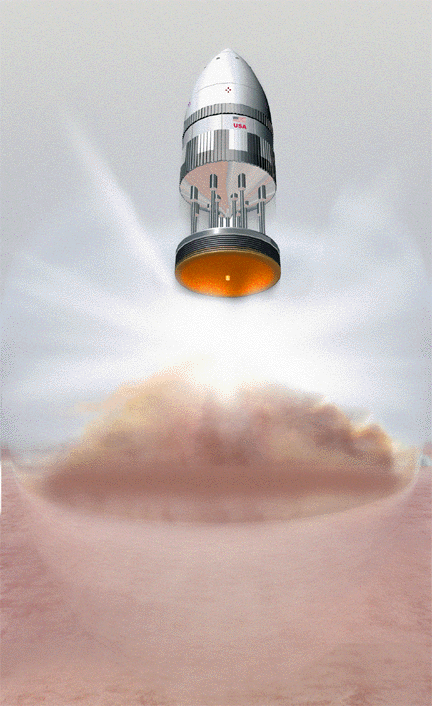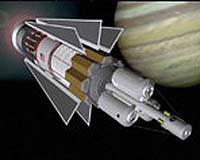Reaching out.
|

Just mining asteroids alone makes the Orion concept well worth serious investigation. The trillions of dollars in valuable metals and minerals waiting for us out there already has mining consortiums drooling. We know for instance that they are rich in Gold, Platinum and Beryllium ores of a nature so pure that no further refinement is necessary. The Eros asteroid is estimated to be worth around 40 trillion united states dollars and that is only one of literally millions of asteroids orbiting our sun. Substances which might be rare or only found in trace form here on earth (therefore valuable) are abundant elsewhere because planetary formation varies slightly for different planetary bodies. Asteroids are too small to posess a planetary core or any significant gravity so both light and dense elements are equally distributed throughout them. On earth, most of the heavy stuff sank down to the core long ago and that's the one place we can't reach it. Opening up space would cause a land rush as these untouched resources are out there for the taking, in quantities beyond the human imagination's ability to even comprehend. But for those not touched by greed, that is only the very tip of the iceberg.
There is the potential for unlimited energy from solar arrays placed in close proximity to the sun. All of which could be made from space resources. We just need to get sufficient industrial infrastructure out there to mine and process the freely available raw materials into photonic cells. Unlimited cheap electricity from space would make our reliance on fossil fuels unnecessary. It's simply a matter of beaming that energy to Earth in microwave form and then transforming it back to electricity on arrival. Technically possible although security issues would ofcourse be a consideration. An accident with such a narrow and intense microwave beam could end up charbroiling area's of the earths surface. So adequate failsafes would go without saying.

The benefits of radically cheaper electricity are astounding. First of all it would bring about an electric car revival, as city dwelling consumers weighed up the costs of escalating oil prices against the plummeting costs of electricity. The hydrogen car would also become attractive to consumers looking to spend less. Hydrogen cars now exist but they are expensive to run because of the methods employed to obtain Hydrogen. One of these is electrolysis, in which ordinary sea water is separated into Oxygen and Hydrogen by an electric current. Cheaper electricity would therefore reduce Hydrogen production costs and that saving would be passed on to the consumer in the interests of out pricing oil. In fact, all industries requiring heavy amounts of energy would benefit. Less energy expenses mean higher profits. Higher profits mean better salaries for staff. Ordinary consumers like you and me could also look forward to lower electricity bills and who can argue with that. Getting back to the topic of Hydrogen a moment, I should point out that while it's hard to make here on earth, it is in fact the most common element in the universe. The larger planets are literally composed of it.
A new range of alloys can be made in zero gravity where heavy and light elements don't separate but mix readily. This means whole new industries will pop up as alloys with special properties are discovered and mass produced cheaply off earth. Space metallurgy will revolutionise the material sciences. Zero gravity allows all sorts of engineering miracles to take place. As an example, precision ballbearings can be produced that are perfect spheres for use in gyroscopes, because any liquid naturally assumes a perfect sphere in such conditions. Space built reflector telescopes can be constructed to any scale desirable without fear of gravity distortion. Hundreds of kilometres in diameter yet only a millimetre thick. Big enough to pick out other earth-like worlds circling neighbouring suns. How do we estimate the value of such a discovery? How would we begin to figure out a price tag for it?

If we wanted to conquer space and begin colonising it then the first mission should be to reach a near earth asteroid. Then we could mine it for the necessary resources to build large space habitats and other spacecraft. The asteroid itself could serve as a spacecraft by simply hollowing it out and attaching engines. This would make an ideal base of operations and secondary vehicle for reaching more asteroids. Asteroid material makes superb radiation shielding by the way. Space is full of positive particulate radiation and solar flares in particular pose a deadly threat. While the Orion crew might stay in a radiation proof bunker for much of the flight out, it would be unreasonable to expect that they would have to spend most of their time in such confined conditions indefinately. The bunker has to be small because it's walls are about four metres thick and that is a lot of extra mass, even for an Orion to lift.
As mentioned earlier, some asteroids are literally Gold mines. Full of all kinds of precious metals and minerals. However, not all asteroids are the same. There are different types and each is composed of different materials. Some Asteroids are in fact dead comets and therefore very rich in volatiles. Volatiles include the elements Hydrogen and Oxygen. Water can be found too, which is really just a combination of those elements. Everything required to replenish life support systems on a manned spacecraft. So recycling of air and water may not even be necessary if an asteroid is our target destination. We can make chemical rocket fuel too. For crossing between worlds nuclear energy is by far the most sensible choice but for zipping around a mining colony we don't need such incredible power. Especially with free rocket fuel on site. There is little in an asteroid which isn't useful. The dirt can be used for ceramics or starting a vegetable garden. Nothing is really wasted.
More Orion vehicles can eventually be constructed from asteroid resources.That's why only one launch from earth is ever necessary. The research and development money spent on learning how to build an Orion isn't wasted on just the one vehicle because that precious knowledge can soon be applied to the construction of space built Orions. Any number of other large scale engineering schemes can be employed too. Space stations for example. Orion would have already paid for itself many times over within the first year of reaching a near earth asteroid. As the fastest possible spacecraft outside of science fiction it would be capable of reaching any destination within the solar system and returning to earth inside of a year.
|

Many people ask "why not just build the first one in space?," to which I usually reply "have you seen the cost of building the International Space Station?". Getting things into orbit is the main obstacle to space exploration. It's just too damn expensive with conventional rockets. Literally a mountain of fuel just to get the proverbial pea into a low trajectory. That's where Orion truly shines. It can haul massive payloads very cheaply. An Orion could theoretically lift it's own mass in extra cargo. We could build an Orion massing one hundred thousand tons and send it anywhere with an additional 100,000 tons of payload. Ordinary chemical rockets are a joke by comparison.
ProjectOrion.com intro page.
Why build an Orion?
Fallout Fallacies.
Orion Links.
Space Message Board.
Project Orion Funding Update!
|

